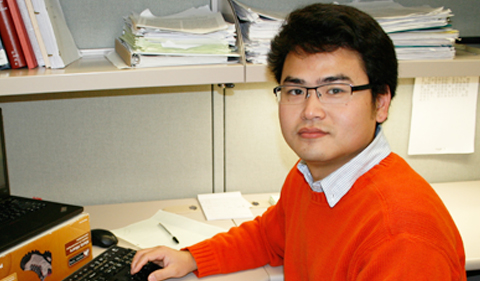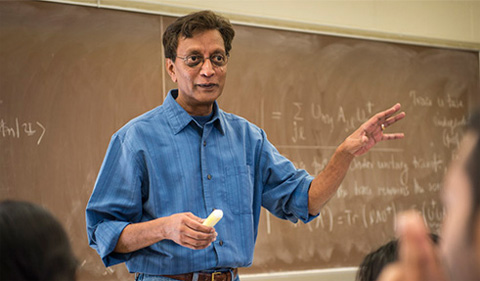By Jean Andrews
Physics & Astronomy
Xilin Zhang, a postdoctoral scholar in the Department of Physics & Astronomy recently completed an Intensity Frontier Fellowship.
Zhang’s fellowship was co-sponsored by Fermilab, a U.S. Department of Energy particle physics and accelerator laboratory in Illinois, and the Institute of Nuclear and Particle Physics at Ohio University. Zhang worked under the direction of Dr. Daniel Phillips, Professor of Physics at Ohio University.
Zhang’s project, “Neutral current induced pion and photon productions off nucleons,” sought to improve models of neutrino interactions with nuclei.
Seeking the Elusive Neutrino
“The U.S. will be investing heavily in experiments in the near future that employ neutrino beams generated at Fermilab,” Zhang said. “Those experiments seek to investigate the nature of these elusive particles. In order to see neutrinos, experimentalists scatter them off nuclei in their detectors. But our lack of understanding of neutrino-nucleus interactions will limit the ability of such experiments to teach us about neutrinos, so improvement in theory is critical to the success of the overall effort.”
“My project lays the foundation for a better theory of neutrino-nucleus interactions. It will constrain neutrino-nucleon interactions from data. I am also very interested in the connection to parity violation in electron-nucleon scattering. This is a subject of intense investigation in nuclear physics, including the Qweak experiment in which Ohio University has significant involvement through professors Dr. Julie Roche and Dr. Paul King.”
In parallel to his work on neutrino interactions Zhang collaborated with Dr. Madappa Prakash, from the department. They studied the thermal properties of nuclear matter in supernova explosions and neutron stars, and will continue working towardcorrelating these properties with observations from heavy-ion collisions.
From Postdoc to Expert
Zhang has published six papers in refereed journals. His work covers a broad range of subjects: the two areas mentioned above, together with the study of reactions from high energy heavy-ion collisions with Professor Jinfeng Liao at Indiana University, and the computation of reactions that are key to understanding the flux of neutrinos from the Sun—a topic Xilin worked on with Phillips and Visiting Professor Ken Nollett.
“Xilin has made excellent contributions to the nuclear-theory effort during his time at Ohio University,” said Phillips. “We’re sorry to see Xilin move on, but excited for the next phase of his career, as he takes up a post-doctoral position at the University of Washington in Seattle.”
Zhang is now widely recognized as an expert in neutrino-nucleus interactions, which was the topic of his Ph.D. research at Indiana University, and in which he continued to work during the past two years in Athens.
‘The Horizon of My Research has Greatly Expanded’
Zhang reflected on his time at INPP. “I feel very fortunate that I’ve had the chance to work in the nuclear theory group here. The horizon of my research has greatly expanded. Daniel has introduced me to a fascinating field on quantum few-body system, and we will continue to develop our ideas in that area. Working with Prakash allowed me to come back to the original topic of my Ph.D. project. I‘m grateful to Dr. Charlotte Elster for suggesting I focus on one problem at a time.”
“I enjoyed interacting with other INPP faculty. And thanks to them, I’m able to meet visiting scholars and host seminars. All these have helped me mature in my academic career.”




















Comments